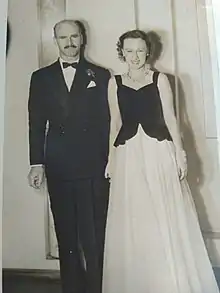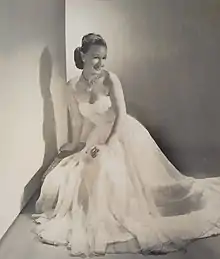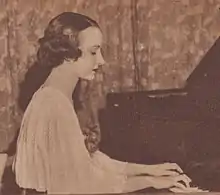Enith Clarke
Kathleen Eileen Doris Enith Clarke[1][2] (1911–1995) was an Australian pianist, noted for achieving considerable critical success in the 1940s.[3]

Career

Born in Rockhampton, Queensland, Enith Clarke showed early promise as a teenager by achieving considerable local success in the piano categories at the annual Rockhampton Eisteddfod throughout the 1920s and early 1930s.[4][5][6][7][8] Later in her career, Clarke returned to the Rockhampton Eisteddfod and donated a special prize for the open piano section as a way to show her appreciation for the event that helped start her career.[9]
In Rockhampton, Clarke received piano lessons from acclaimed local music teacher and soprano Florence A Sandberg,[3] who herself was a former student of noted Czech-born violinist Louis D'Hage.[10][11]
Through successful examinations, Clarke achieved Associate in Music, Australia and the Associate of the London College of Music (ACLM) diplomas[12][13] and her talents were soon receiving interest from the likes of Ignacy Jan Paderewski, Arthur Rubinstein and Wilhelm Backhaus.[14][15]

In the early 1930s, Clarke relocated to Sydney to study under Russian-born pianist Alexander Sverjensky.[16] During this time, Clarke also began performing with the ABC's live broadcasting orchestras on radio stations 4QG in Brisbane and 2BL in Sydney, marking the start of Clarke's long association with the Australian Broadcasting Commission.
Having been coached under Curt Prerauer and Maurice Abravanel with the ABC Orchestra, Clarke began an association with Alfred Hill during her time attending the Alfred Hill Academy of Music.[17] Clarke made her concert debut on 21 July 1936 playing Liszt's Concerto in A major.[17] Hill also arranged for Clarke to perform with Ernest Llewellyn for the first public performance of a sonata Hill had composed for violin and piano.[17] Following her performance of Liszt's Concerto, Hill sent a letter to Rockhampton mayor Robert William Evans, in an attempt to "solicit" the assistance of the people of Rockhampton in helping Enith Clarke with her career as, according to Hill, she deserved all possible encouragement as she would prove to be a credit to her native city.[18]
Enith Clarke's career peaked in the 1940s when she received mostly positive reviews of her work in the Sydney and Melbourne press, including from English critic Neville Cardus.[19][20][21][22]
In 1948, at the suggestion of Claudio Arrau[3] Clarke went overseas to further her studies, where she received daily three-hour lessons in Lausanne from Alfred Cortot, who praised Clarke's ability and technique.[23] Clarke also received lessons from Walter Gieseking.[3]
In 1948, Clarke said one of her biggest ambitions to have been realised was playing as a soloist with the Sydney Symphony Orchestra conducted by Eugene Goossens, who Clarke believed to be the best conductor in Australia. Goossens expressed his admiration for Clarke's piano playing.[3]
Personal life
Clarke was a daughter of English immigrants Charles and Susan Clarke (née Aplin) who had sailed to Australia on a year-long voyage from England, leaving in April 1887 and arriving in Rockhampton in April 1888, and marrying upon their arrival. Charles Clarke gained work in Rockhampton as a local butcher, owning his own business and retiring when he reached the age of 74. Enith Clarke's parents celebrated their 60th wedding anniversary in 1948.[24]
Aside from music, Clarke was known for being a competent aircraft pilot, often using planes to visit friends on remote stations in rural areas.[25]
Shooting and fencing were other known hobbies.[26]
Clarke had a superstition of always having a gold horseshoe tied in a handkerchief while giving piano recitals.[27]
Marriage to Sverjensky
In 1943, Clarke became engaged to her former teacher, Alexander Sverjensky, who had given her a scholarship after she arrived in Sydney.[28][27]
The marriage between Clarke and Sverjensky came to an abrupt end when Svejensky filed for divorce in December 1950 after accusing Clarke of committing adultery with three different men during their marriage.[29]
The three co-respondents originally named in the suit were Arthur Selwyn Hurd, former police officer Emil Norton Davis, and former Consul for Portugal Alvaro Brilhante Laborinho. Hurd denied the charge, and he was dismissed from the suit with Sverjensky ordered to pay his court costs.[29]
Sverjensky was granted a decree nisi after the judge ruled that Clarke had committed adultery with Davis at Surfers Paradise in January 1946, and that Davis had also committed adultery.[30] It was also found that Clarke had committed adultery with Laborinho in Sydney, in February 1948. However, the judge did not find that Laborinho had committed adultery with Clarke.
The evidence presented during the divorce case, including discussions about nude photos, a suspected pregnancy and letters containing references to a "sugar daddy", provided substantial material for the tabloid press including Sydney's The Sun.[31][32][33]
Later years
Following her public divorce, Clarke's piano playing career failed to reach the heights it did in the 1940s, and she spent some years teaching piano at schools in Sydney such as Abbotsleigh and Meriden throughout the 1960s and early 1970s, before returning to Queensland.[3]
However, Clarke did travel overseas in 1952 to play background music in three films released by a French film company, and to appear on BBC Television.[34]
Enith Clarke died in 1995.[3]
References
| Wikimedia Commons has media related to Enith Clarke. |
- Entry 1201: Clarke, Kathleen Eileen Doris Enith, 210 Campbell Street, Rockhampton, musician, Australian Electoral Roll; Division of Capricornia (Subdivision of Fitzroy), 1932. Retrieved 12 October 2017.
- Entry 1424: Clarke, Kathleen Eileen Doris Enith, 76 Elizabeth St, Rosalie, pianist, Australian Electoral Roll; Division of Brisbane (Subdivision of Ithaca), 1936. Retrieved 12 October 2017.
- Enith Clarke Papers (1924–1989), Manuscripts, Oral History and Pictures Catalogue, State Library of New South Wales. Retrieved 12 October 2017.
- Music Festival – Rockhampton Results, The Brisbane Courier, 4 June 1923. Retrieved from National Library of Australia 12 October 2017.
- The Eisteddfod: The Awards, The Capricornian, 14 June 1924. Retrieved from National Library of Australia 12 October 2017.
- Evening Eisteddfod, The Morning Bulletin, 2 May 1925. Retrieved from National Library of Australia 12 October 2017.
- Rockhampton Eisteddfod – Large Attendances at Saturday's Sessions; Part of Night's Programme Broadcast by 4QG, The Morning Bulletin, 7 May 1928. Retrieved from National Library of Australia 12 October 2017.
- Champion Soloists Determined; Miss E Clarke Again Piano Champion, The Morning Bulletin, 4 October 1932. Retrieved from National Library of Australia 12 October 2017.
- Enith Clarke Prize At Eisteddfod, The Morning Bulletin, 14 June 1946. Retrieved from National Library of Australia 12 October 2017.
- Social Chat with Kaye, The Morning Bulletin, 17 February 1950. Retrieved from National Library of Australia 12 October 2017.
- McDonald, Lorna L D'Hage, Ludwig (1863–1960), Australian Dictionary of Biography, Volume 8, 1981. Retrieved 12 October 2017.
- A Successful Student, The Evening News, 7 December 1929. Retrieved from National Library of Australia 12 October 2017.
- Miss Paramount; Miss Enith Clarke Chosen, The Morning Bulletin, 18 July 1933. Retrieved from National Library of Australia 12 October 2017.
- Music is her greatest gift, What Women Are Doing], The Australian Women's Weekly, 20 August 1938. Retrieved from National Library of Australia 12 October 2017.
- Photo: Enith Clarke and Arthur Rubinstein, The Morning Bulletin, 22 October 1937. Retrieved from National Library of Australia 12 October 2017.
- Back to Sydney to Study, The Telegraph, 4 June 1935. Retrieved from National Library of Australia 12 October 2017.
- Miss Enith Clarke, The Morning Bulletin, 18 July 1936. Retrieved from National Library of Australia 12 October 2017.
- Appeal to Music Lovers of Rockhampton; Letter from Academy Director, The Morning Bulletin, 3 November 1936. Retrieved from National Library of Australia 12 October 2017.
- Enith Clarke's Piano Recital, The Sydney Morning Herald, 24 August 1945. Retrieved from National Library of Australia 12 October 2017.
- Cardus, Neville Enith Clarke, a pianist much improved, The Sydney Morning Herald, 7 March 1947. Retrieved from National Library of Australia 12 October 2017.
- Pianist in Farewell Appearance, The Sydney Morning Herald, 8 April 1948. Retrieved from National Library of Australia 12 October 2017.
- Briggs, Ernest Fine Colour by Pianist, City Music, The Courier-Mail, 8 May 1948. Retrieved from National Library of Australia 12 October 2017.
- Tribute to Aust. Pianist, The News, 7 September 1948. Retrieved from National Library of Australia 12 October 2017.
- Diamond Wedding, The Morning Bulletin, 29 April 1948. Retrieved from National Library of Australia 12 October 2017.
- Women Fliers of Other Days, The Argus, 19 August 1944. Retrieved from National Library of Australia 12 October 2017.
- Versatile, with an unusual variety of interests, What Women Are Doing, The Australian Women's Weekly, 12 October 1935. Retrieved from National Library of Australia 12 October 2017.
- A Story of Success, The Morning Bulletin, 27 April 1948. Retrieved from National Library of Australia 12 October 2017.
- Social Gossip, The Morning Bulletin, 4 June 1943. Retrieved from National Library of Australia 12 October 2017.
- Musician seeks divorce, The Sydney Morning Herald, 1 December 1950. Retrieved from National Library of Australia 12 October 2017.
- Musician's Divorce; Judge Grants Petition, The Sydney Morning Herald, 8 December 1950. Retrieved from National Library of Australia 12 October 2017.
- Music Professor names consul in divorce suit, The Sun, 30 November 1950. Retrieved from National Library of Australia 12 October 2017.
- Co-re denies misconduct with Mrs. Sverjensky, The Sun, 1 December 1950. Retrieved from National Library of Australia 12 October 2017.
- Pianist wrote of Sugar Daddy, The Sun, 7 December 1950. Retrieved from National Library of Australia 12 October 2017.
- Changed mind on film offer, The Courier-Mail, 3 September 1952. Retrieved from National Library of Australia 12 October 2017.